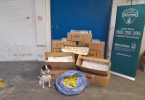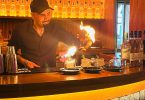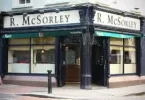Tourism & the licensed trade
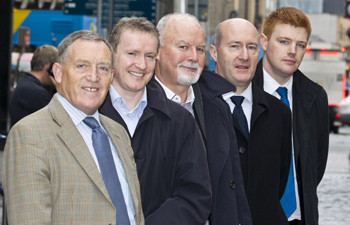
Pat Nolan: Is tourism under-rated in the economy?
Tony Foley: It’s not so much that it’s underestimated but everyone should be paying more attention to tourism.
At the height of the tourism boom in 2007 we’d about eight million foreign visitors. It’s now about 6.5 million so there’s 1.5 million potentially there to be pulled back pretty quickly. It’s an area that’s critical for employment. It’s labour-intensive, indigenously determined, using local resources so it’s a sector with tremendous potential but it’s realising that potential is the problem.
The hotel industry is in difficulty with huge over-capacity. So we should pay more attention to tourism.
There’s an apparent contradiction in the Government’s approach: on the one hand they say we must enhance competitiveness, on the other they’re thinking of imposing the first four weeks of sick pay on the employers or increasing Employers’ PRSI contribution – which isn’t boosting competitiveness, it’s doing the exact opposite.
Long-term stratetic plan?
Brendan Flynn: I’d agree. It’s down to two or three things where we’re missing the opportunities. The infrastructure is sitting there. It was built during the Celtic Tiger years. We’ve got magnificent natural beauty, we’ve built stadia, airport terminals, LUAS infrastructure, magnificent hotels and bars, all sorts of leisur facilities sitting there lying idle.
On the other hand, we get incredibly positive visitor feedback.
Now take the growth in global tourism numbers and realise that we don’t have a long-term strategic plan, a vision for the industry. That’s fundamentally what’s wrong. We don’t have the leadership and we’re not all working to the one plan. We’ve a lot of bodies both in central and local government and associations. They’re not talking to each other in a strategic way about how we can best maximise the opportunities.
I think the associations have become lobby groups for the minutiae of the industry. There are very important issues like JLCs, rates and VAT but strategically they should be looking to their members, saying, “How can we grow your business?” and “How can we work together?”.
The VFI, LVA, RAI and IHF – how can we get these people to work together and say, “There’s a much bigger picture here”?
PN: So you’re suggesting we become less reactive and more proactive?
BF: Definitely.
The Gathering
Gerry Rafter: The VFI have emphasised that tourism is vital not just for our trade but for agriculture etc. Two years ago our national conference in Ennis launched a concept called Raising the Bar. We joined with Fáilte Ireland setting up the Fáilte Ireland Accreditation system. They’d already set this up for the hotel industry, the equestrian sector, guest houses and golf clubs. We felt we needed to be part-and-parcel of the whole picture.
Tourists come to Ireland by the planeload to see what Lonely Planet has told everybody: that the Irish pub is iconic, the main tourist attraction for which people came to Ireland. When they left the country, that’s what they had the taste of in their mouths, the great craic and the great fun that they’d had. Our biggest challenge is to get our members to buy into the concept.
The Irish pub’s playing a very strong and vocal role in The Gathering next year. We’ve had a meeting with Minister Varadker who I was very impressed with in his whole concept and drive for it.
We told him what we wanted to do and how we wanted to get involved by putting some of our members on the County committees set up to run The Gathering. We wanted the pub to be the focal point because when people come home from abroad the first place they go to meet with long-lost friends to enjoy a pint is the pub. It has a pivotal role to play in tourism.
Ray Keaney: Ours is an industry primed to respond to national objectives such as reducing the budget deficit, creating new jobs, tackling long-term unemployment and the regeneration of vibrant communities across the country. In the UK, for example, a study by Oxford Economics for the British Hospitality Association showed that in 2011 – 2015 some 235,000 net new jobs could be created if the right environment was created for tourism to capitalise on the opportunities.
PN: Did they go into what the right environment might be?
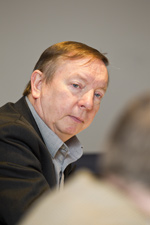
"You’re not going to survive on a local population reducing its drink intake and tourists taking the odd drink….’ – Pat Nolan
RK: David Cameron made a very positive speech on tourism shortly after he became Prime Minister. They’re looking for Government and industry to work together, they’re looking at what’s happening in Europe and if they could bring all that together there’s huge potential.
Brendan also touched on the whole issue of the opportunity. If you look at world tourism figures, in 1980 there were 235 million international tourism arrivals. This year, for the first time, we’ll pass the one billion mark and that figure will be 1.8 billion by 2030.
Closer to home, arrivals in Europe will increase by 240 million between 2010 and 2020. People will continue to travel. The question is, how can we convince them to come here? More and more people are travelling; there are huge opportunities not just in Europe but in emerging countries such as Africa and the BRIC countries.
Investing in tourism
Paul Murphy: In terms of the importance of Irish tourism to the economy, consider Ireland’s investment – over €100 million in capital projects alone, the Government’s reduction of the VAT rate, the backing of the Gathering etc – tourism is one of those industries that encompasses a whole lot of different businesses and within those businesses there are a huge variety of different employment opportunities at all levels. The Tourism Industry will be key to economic recovery and returning to growth.
We have very proactive and supportive Ministers in Leo Varadkar and Junior Minister Michael Ring who have been behind key projects such as The Gathering Ireland, the National Culinary Traineeship and the Pub Accreditation scheme for example.
The Accreditation scheme is a good example of Fáilte Ireland working together with the sectors to improve industry standards. Ireland has plenty of Unique Selling Points but tourists visiting here seek a quality experience, a quality product including accommodation and food. The recent Visitor Attitudes Survey identified the pub as almost a secondary tourist office so making sure Pubs are informed on the local product and offering, clean, with good product and friendly efficient service is imperative.
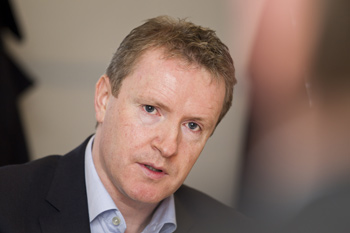
"Ours is an industry primted to respond to national objectives such as reducing the budget deficit, creating new jobs, tackling long-term unemployment and the regeneration of vibrant communities across the coutnry" – Ray Keaney.
Attracting the tourist
PN: Does the drinks drinks industry take enough notice of the tourism industry, as opposed to the other way round?
TF: I think we should be concentrating far more on the micro-determinants of how we get tourists here? What do they do when they’re here? What prices do they pay?
The bottom line – we have to get people to come here. People come because of ethnic connection. Some respond to advertising, marketing etc.
A lot of evidence says people enjoy their stay here but there’s also a lot of evidence that there isn’t huge repeat business so maybe the nature of our product is that people come to Ireland once but they’re not going to be coming back every two or three years. That will determine the strategy.
We have to think more about the quality and value-for-money we’re giving – the actual reaction of consumers to what they’re getting here. Is it an ideal place for families, for younger people? Is it more ‘Visit the Wilderness’ as opposed to ‘Visit the Cities’ or different types of things?
Its impact on the licensed trade is where I might disagree with people on employment. We get, say, seven million overseas tourists. On average they stay about a week-and-a-half. Now, bearing in mind that they might spend a bit more money, tourists don’t spend much more money on alcohol than Irish people do. Effectively the tourist market is equivalent to five per cent of the national market for the on-trade.
Some pubs would be in ‘touristy’ locations and make up 50 per cent of the market. In other places it might be negligible so it’s not going to be a saviour for pubs in the absence of the domestic market. I wonder do we delude ourselves over the quality of the product and the type of people coming and whether they’ll keep coming?
The British market has collapsed. That’s partly because they don’t have as much money as they used to but it might also be because we don’t have the diaspora who want to come back. I think we need to look tightly and nastily at the product we’re offering as opposed to thinking that the potential will in any sense be realised without major difficulty.
Every country in the world is saying tourism’s a possibility. Even the rich part of the world is putting a lot more effort into tourism so it’ll be a very competitive world out there.
BF: I’d agree. The Gathering is a great initiative, hopefully with long-term benefits. But what happens in 2014, 2015 and 2016? A grand plan’s needed because the Government has seen the success of a grand plan in science & technology and in agriculture & food. A 2020 harvest report came out in 2007, a strategy where all elements of the industry have come together working towards a plan. We’re seeing the benefits of that in terms of employment, exports, Government revenues and everything that flows from that.
Get people to sign up to a plan, a strategy – the marketing strategy needs to be looked at.
The British market has fallen off a cliff but does that mean we need to go and spend another €30 million on the British market or should we look a little more widely at what’s available out there? Other countries and other cities compete for these tourists… There’s a wealth of people in Europe, the Scandinavian countries, who’re very wealthy. They’re into their history, art and culture, not looking for two weeks by a swimming pool. There are numerous different examples.
Catering for the tourist
PN: If you have a pub that offers accommodation you can make money on that. If you put good food in the pub you can make money on that: it’s a kind of a holistic thing.
BF: It is. I’ll use my own business as an example. My business has moved much more towards food and foreign visitors. We’ve seen our Dublin business slide slowly down but food and foreign visitors rise. The pub trade needs to look at food as a bigger part of its overall offering. On the basis of having good food and good service, we’ll sell the beer and wine that accompanies that.
We need to ask who are the customers? For instance, I think the lack of multi-lingual menus is an insult to visitors. We’re dictating that they speak English.
There needs to be joined-up thinking. When someone gets on a flight here we should think, ‘What does this person want?’, not ‘What do we provide?’.
There’s great support from Fáilte Ireland, Tourism Ireland is very good, the local councils etc but we’re all doing bits and pieces without joined-up thinking. City councils have individual departments, particularly in Dublin, with events in the parks and a lot of the time these departments don’t talk to each other as much as they should. They don’t talk to the businesses outside. If there are small events or festivals, they need to involve the local pubs saying, “There’s an opportunity to promote what we’re doing here, to get visitors coming in and sell them some food and drink on the back of it”.
GR: Years ago the drinks trade was probably 70 per cent on- and 30 per cent off-trade. Now it’s 55 off-trade and 45 on-trade at best. For every one job in the off-trade there’s six in the on-trade. If we’re creating tourism jobs across the country, they’re in areas where there’s less likely to be other forms of employment. Kilkenny would have very little industry but a very strong tourist trade. The same with Killarney and Galway. You’re giving employment to people who probably wouldn’t be able to get jobs in manufacturing; those industries just aren’t around rural Ireland. For us to survive and thrive, we have to diversify down the road of tourism whether that be by adding food or accommodation to the offering…
PN: Have you any choice? You’re not going to survive on a local population that’s reduced its drink intake and a tourism industry that takes the odd drink.
GR: Pat, not everyone has the option to go into food or accommodation. In some parts of rural Ireland it doesn’t hold a lot of relevance. If you did go down the route of food it would be to support the indigenous local population around you. Not everywhere has tourists flocking to it. Every publican in the country can’t get into food because it’s not going to make money for them all and they wouldn’t be long about going out of business. It’s relevant, but not for everybody.
PN: What happens to the pub at the crossroads, not in a population centre? Paul, what’s not being done by the licensed trade at the moment?
PM: Social Media’s one area that could be embraced more. It’s a free and ready-made platform for engaging with customers, reaching out to that demographic that might go to the pub again – or more often – rather than stay at home.
You can create events, showcase food, music and entertainment, run special offers and loads more…It’s the ideal platform for marketing a pub business.
PN: What does the Pub Accreditation scheme mean to a Frenchman?
PM: Basically a recognisable quality mark. These pubs will be highlighted on our consumer websites DiscoverIreland.com and Visit Dublin.com platforms with 300,000 visitors to the Visit Dublin website monthly and a similar number to DI.
Tourists want authenticity, a genuine Irish experience. But every premises has to have a set of operational standards and more importantly, maintain them. You’ve to have a set of procedures that everyone works towards, agreed by the owner/management and imparted down the line.
A premises can look great and market themselves well but go into a pub and get poor inattentive service, attitude, chipped crockery and bad toilets and its all in vein. There’s no excuse really…It’s the one thing that every business can eradicate, it just needs to be focussed on.
PN: Ray, is there anything the licensed trade should be doing that it’s not doing?
Vision in tourism
RK: We need parallel plans for the day-to-day operations and the longer-term. What can businesses do this month and this year that haven’t been done before? Strategically when we talk about tourism in this country the only area we tend to focus on is marketing. We ignore key issues such as innovation, digital capability and research & development.
One of the outcomes from the Global Irish Forum last year was that Ireland should aspire to be the best small country in the world in which to do tourism. However we’re not going achieve this if we simply go from year-to-year in terms of developing our strategy for tourism.
Look at the Programme for Government and the tourism commitments in it. I think it’s fair to say those commitments have already been delivered.
The VAT reduction, the visa obligations, The Gathering next year – these are all very significant and positive developments but fundamentally they’re short-term.
Where’s the vision for Irish tourism in 10 years’ time? We need to start thinking about where we’re going to position ourselves and what we’re going to offer.
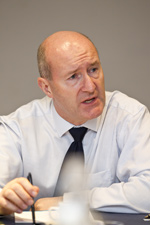
"You’re giving employment to peole who probably wouldn’t be able to get jobs in manufacturing; those industries just aren’t around rural Ireland" – Gerry Rafter.
GR: We got involved in a forum in the Tralee Institute on the board of the Irish Academy of Hospitality and Tourism. One of the big issues – maybe in our area more than the hotel trade – is the huge gap in good quality chefs. There’s a lot of us want to step up to a better level of service but there’s a huge scarcity of quality.
BF: Publicans see their job as providing food and drink for tourists but they need to look at the overall tourist experience. The question is: can they work with other providers to have an overall package, whether it’s €15 or €20 or €30 per person for a trip and a meal and a beer or glass of wine afterwards?
We’re doing it in a small way in the city centre but I think that can be done even for the pub at the crossroads. But they need to get out there and talk to other people who’re dealing with tourists.
This is all about the providers facing the customers and saying, “What do you want? “.
In my own business, I’d tourists standing at the door of The Church and not moving.
The type of Europeans coming in were not used to seating themselves. I realised I needed to provide a host or hostess during the week. It’s expensive and while it has greatly enhanced our customer experience, it’s still not right because our hosts are not multi-lingual. So the ultimate for me is that someone will walk in and no matter what language they speak, they’ll be made welcome.
I’m making a point about the market segment you go for.
In 2001 New York recognised that tourism could be a huge economic driver in terms of revenue and jobs. They had 34 million visitors per year and set a target of 50 million by 2015. They got all the industry and local government into a room and decided on a vision, asking, “What do we need to do that?”.
They were brave enough to stand back and do what needed to be done rather than adapting what they already had to try and achieve the target.
They went from 35 million to 50 million visitors per year and did it four years ahead of target in an environment of the huge prices that they charge.
I’m not saying we can be New York, but we can look to other places and see how they’ve done things. We can learn from them.
We have all these invisible lines: “They do this and they do that” and so on.
I had a conversation with senior people in Heineken – I had a separate conversation with Diageo – and I said: you guys spend tens of millions marketing your beers in this country. You’re fighting for the fiver coming across my counter. Why don’t you consider getting into a room with other people from Tourism Ireland, the city councils and everyone else involved in the industry to come up with a plan to make more fivers?
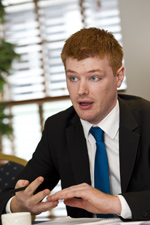
"Social Media’s one area that could be embraced more. It’s free and a ready-made platform for engaging with customers, reaching out to that demographic that might go to the pub again – or more often – rather than stay at home" – Paul Murphy.
Tourism building
PM: I’d like to pick up on the bundling and local pubs watching what’s going on round them – very important. We talk about pubs being expensive and can cite loads of reasons for that…excise, VAT rates, labour. If you can add value to your offering and take the focus away from “It’s costing X”, give them something that they mightn’t be getting elsewhere, it doesn’t have to be an expensive add-on for pubs. It’s about asking “What’s going on around me?”.
Social media, standards, not working in isolation…. Everything we do has to be geared towards finding out and providing what the customer needs – not what we think they need.
Be aware of your surroundings, your market and connect with it. Fáilte Ireland have invested hugely in our business supports. We offer menu translation and websites; we’ve Sales Connect which enables businesses to go out and find out what the Germans want and we’d focus that on the four key markets along with our research.
The trade can take part in these programmes, go on workshops, go out and get the tools and proactively ensure that they’ve a website.
RK: I think all businesses will have to get more involved in their local community and destination development. To give one example, Virginia’s recent Pumpkin Festival gave people a specific reason to visit the town with resultant benefits for local publicans and retail outlets. Furthermore The Gathering offer the opportuntiy for people to understand that in order for businesses to survive into the future, they have to join together and work together.
All the top IT companies have their European headquarters here in Dublin. We could consider an initiative of sitting down with these people – they’re all in town, the brains are all here – to see how we, as an industry, might mobilise their expertise.
PN: So you’re suggesting we get together with the Googles and the Facebooks …?
RK: Why not? To me there’s a huge opportunity there.
The future is about partnership. It’s not about individual businesses any more. Networking…
GR: I think that during the Celtic Tiger, a lot of us got complacent.
One thing we were very famous for in our trade was the fáilte and the sláinte. That’s one thing that’s gone missing and we really need to get it back. We were famous for the Irish pub, the music, the craic, the big smile, the Island of a Thousand Welcomes. We have to get that back.
In working with Fáilte Ireland on Accreditation, one of the big issues we had was the fáilte and the sláinte and we put 40 per cent of the marks down to the fáilte and the sláinte, the customer service.
We definitely have to get back to where we were with the smile, the fáilte. We have to remember that we’ve domestic Irish tourism as well. It’s an area I do particularly well out of. Apart from a few months in the Summer, it may not be a week-long event but more designed towards weekend tourism. We’re dealing with bundling in terms of golf, food, cocktail-classes, make-up for the ladies etc – particularly if they’re coming in ladies’ groups.
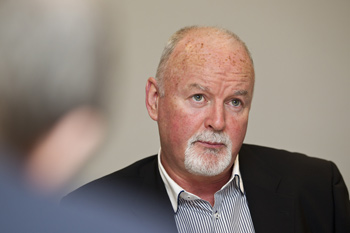
"The British market has fallen off a cliff but does that mean we need to spend another €30 million on the British market or should we look more widely at what’s available out there?" – Brendan Flynn.
TF: I think the licensed trade has to sell its product better. I’d be particularly conscious of culture themes, history themes; we’ve pubs hundred of years old where most history happened in the back rooms of pubs and we don’t package that and sell it. Ideally we’d maximise our traditional historical attractions: culture, music etc accessed by the latest technology so we’d have sophistication, modernity and tradition brought together.
So what pubs have to do is to do what they do – but a lot better: the quality of service, the prices they charge, the package, the whole ambience, the craic we think is wonderful…
BF: We’ve had some huge wins in Dublin with the Tall Ships and the American football match. And certainly the suppliers have seen the spin-off in the drink sales across the whole city. The benefits are obvious if we can improve and grow tourism numbers. The question is, what can individual pubs do and what can associations do?
We’ve got to look for international best practice to see who does better what we do. I don’t believe we need to re-invent the wheel but I think we can learn different things from different parts of the world.
I think the associations should inform members that there’s this opportunity and talk about what people can do on a low level and a high level as to how they can get involved. The individual publicans should then co-ordinate efforts with Fáilte Ireland, with the city councils, with the other shopkeepers on the street. I think the members themselves have the solution if we inform them of the opportunity.
I think everyone should work together to get support from the suppliers, get them on board and say, “If we can achieve some success there’s a huge payday down the line for you guys”.
Ultimately I’d like to see everyone working together to drive a much bigger, more ambitious agenda.
We mentioned Minister Varadker earlier on. He’s the head of tourism but ultimately Enda Kenny is the head of tourism, he’s an ex-Tourism Minister. In New Zealand the Prime Minister himself holds the tourism brief. They may be much more isolated than we are, but they recognise tourism as being a huge economic driver and the tourism mandate is with the Prime Minister.
Here, tourism is seen as a luke-warm portfolio. We have a huge job in the industry to drive an agenda with the business media, the general media, with our own people to say, “Hey, tourism is a really good healthy industry”.
In education why do we kow-tow to the likes of Lucerne in Switzerland? Why can’t Ireland put it on its agenda to say, “We’re going to become so known that in 30 years’ time people will say ‘If you want to get into tourism, go to Ireland and train there for 10 years’?”.
I think that’s the sort of ambition we should have.
One last point about tourism: the amount of small indigenous industries – one-man, two man, families – that can spring up out of tourism… These are jobs that can stay with us forever so long as we keep the product and the service right. I think there’s always the fear that the huge companies we alluded to earlier on can pluck themselves out of here and re-locate to other parts of the world but tourism – if we get it right we can have it forever.
PM: I worked in Tourism Education prior to this role. We have a fantastic infrastructure in Ireland for Tourism and Hospitality education, one of the best in Europe. We have a network of Institutes of Technology with state-of-the-art training kitchens, bars and restaurants. We do a lot of international benchmarking. Graduates are trained to a very high standard and that reflects, I think, in the level of service that we can offer the tourist.
Having a high standard and training is only one side; when trainees and graduates go out into industry that training and support must continue. Businesses must look at the training they carry out and provide opportunity for promotion and development. Ultimately, a happy motivated employee will impact positively on the tourist/customer’s experience.
There’s nothing worse than a disgruntled employee in a business affecting all the other employees and it’s very hard to catch from a management perspective.
TF: If the argument is that you’re coming to Ireland because of the native attraction and the craic and then you’re meeting foreign students in the bar, then there’s a problem.
RK: Just on that point, if you look at what other sectors are doing, notably the engineers, scientists and mathematicians, they’re very good for organising their own dedicated ‘week’, getting lots of coverage and encouraging everybody into the sector. I know Fáilte Ireland has done some work but broadly speaking, we don’t market our sector as one that should be considered as an attarctive career choice…
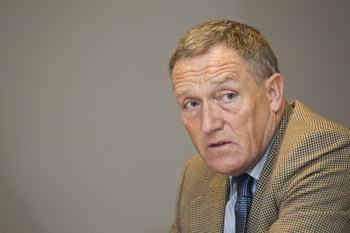
"Maybe the nature or our product is people come to Ireland once but they’re not going to come back every two or three years" – Tony Foley.




